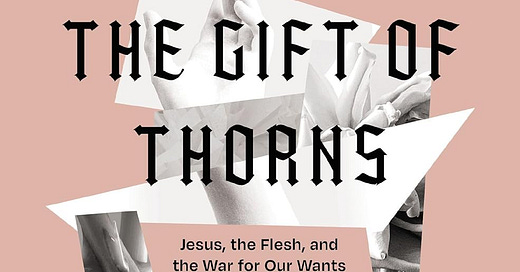Thorny matters, an author interview
A.J. Swoboda talks about his new book, *The Gift of Thorns: Jesus, the Flesh, and the War of Our Wants* + the Church Blogmatics March Madness Champion
Gentle reader,
Today, I get to bring you an interview with author
who talked with us about his new book The Gift of Thorns: Jesus, the Flesh, and the War of Our Wants (239 pages, Zondervan).Before that, let me announce the champion of the Church Blogmatics women in contemporary theology March Madness book bracket.
The winner is…
Keep reading with a 7-day free trial
Subscribe to Church Blogmatics by Beth Felker Jones to keep reading this post and get 7 days of free access to the full post archives.




